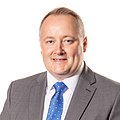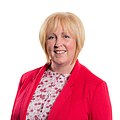First RT Davies Shadow Cabinet | |
|---|---|
| Shadow Cabinet of Wales | |
| 2011–2016 | |
 RT Davies' Assembly photo, 2016 | |
| People and organisations | |
| Monarch | Elizabeth II |
| Leader of the Opposition and Shadow First Minister | Andrew RT Davies |
| Member party | |
| Status in legislature | Official Opposition 14 / 60 (23%) (2011) |
| History | |
| Election | 2011 assembly election |
| Legislature term | 4th National Assembly for Wales |
| Predecessor | Shadow Cabinet of Nick Bourne Interim Shadow Cabinet of Paul Davies (May-Jul 2011) |
| Successor | Shadow Cabinet of Leanne Wood |
Andrew RT Davies became Leader of the Opposition in July 2011, after he was elected leader of the Welsh Conservatives, [1] which formed the second largest party bloc in the National Assembly for Wales (later Senedd) after the 2011 National Assembly for Wales election. [2]
Contents
- History
- Initial Shadow Cabinet
- 2014 Reshuffle
- Dissolution
- Members
- July 2011–February 2014
- February 2014-May 2016
- References
The Welsh Conservatives had previously formed the opposition under Nick Bourne from 2007-2011 while the third largest party, as the second largest party, Plaid Cymru, joined Welsh Labour in government. At the 2011 election, the Conservatives became the second largest overall party, gaining two seats, whilst Plaid Cymru lost 4. [2] Bourne lost his seat at the 2011 Assembly election, [3] prompting the 2011 Welsh Conservatives leadership election. Andrew RT Davies won this election, defeating Nick Ramsay with RT Davies receiving 53.1% of the vote. [1] He took leadership of the party, and the role of Leader of the Opposition in July 2011. Paul Davies had served as interim leader for the two month period between the Assembly election and the choice of a leader. [4]
Davies' Shadow Cabinet lasted until the 2016 National Assembly for Wales election, after which Plaid Cymru briefly became the second largest party, forming a Shadow Cabinet under Leanne Wood. [5] However, after Dafydd Elis-Thomas left Plaid Cymru, [6] and UKIP's Mark Reckless joined the Conservative group in the Assembly the Welsh Conservatives again became the largest Assembly Group, [7] allowing Andrew RT Davies to form his Second Shadow Cabinet in 2017. He would later form two more Shadow Cabinets, the third from January to March 2021 [8] [9] and the fourth from 2021 to present. [10]











